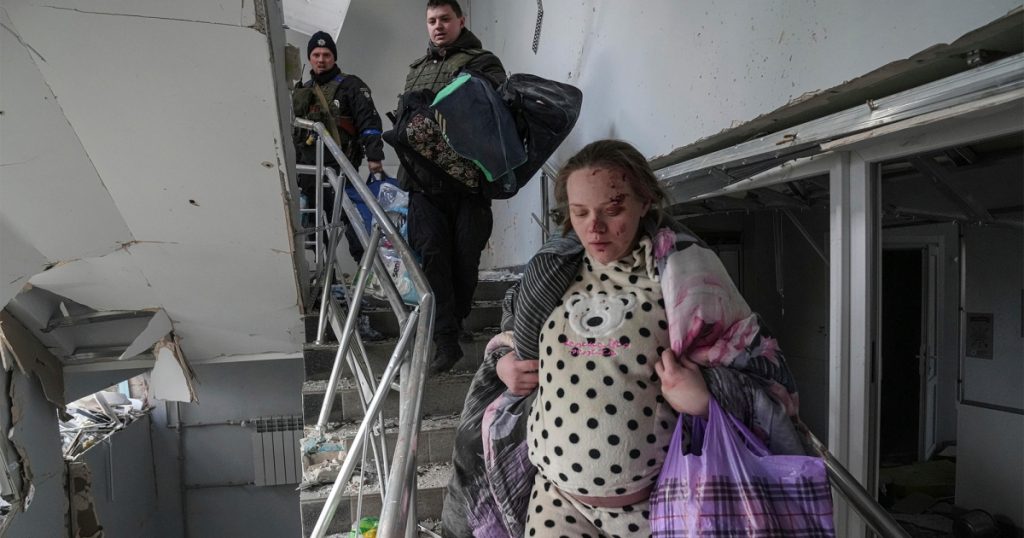Russia Has a Long, Cruel History of Attacking Hospitals. Maybe This Time Its Leaders Will Be Prosecuted.
Fight disinformation. Get a daily recap of the facts that matter. Sign up for the free Mother Jones newsletter.Leonard Rubenstein is a professor of practice at the Johns Hopkins Bloomberg School of Public Health and core faculty at the Johns Hopkins Berman Institute of Bioethics. He is the author of Perilous Medicine: The Struggle to Protect Health Care from the Violence of War.
The photo of a pregnant woman, possibly in labor, being carried out of a destroyed maternity and children’s hospital struck by Russian forces in the city of Mariupol became yet another iconic image of Russia’s assault on civilians in its war against Ukraine. The high number of injuries, the sheer size of the craters caused by the explosion, the reports that it was heard a mile away, and the contemporaneous visual evidence easily refute Russia’s denials of waging war on civilians. Even childbirth was not exempt from Russia’s strategy in the war.
Attacks on hospitals and ambulances began on the first day of the war and have continued at a rate of about one or two per day, now totaling more than 60, according to the Ukrainian Ministry of Health. The World Health Organization has already found sufficient evidence to confirm 24 of them on its dashboard of global attacks on health care. Doctors, emergency responders in ambulances, and patients have all been killed. Volunteers have been shoveling sand into bags and bringing them into hospitals to protect them, as much as possible, from the impact of heavy weaponry. Patients have been moved into dank basements that are usually considered inappropriate for care, just as a precaution.
Given Russia’s record, no one should be surprised by these atrocities. In recent decades, Russia has been among the worst perpetrators of attacks on health care in conflicts. In the war in Chechnya from 1999 to 2000, for instance, Russia destroyed or severely damaged hospitals in the capital, Grozny, and elsewhere while targeting doctors who provided care to all in need. In Syria, it joined the Assad regime in bombing and launching missile attacks against hospitals located in opposition-controlled areas; between the two perpetrators, more than 500 hospitals were hit. When Syrians began moving hospitals underground and in caves, Russia used 1,000-pound “bunker buster” bombs against them. In these wars, the attacks were part of a broader campaign not only to defeat an adversary but to punish or forcibly displace civilians for supporting Russia’s enemy.
People gather around the rubble of a hospital supported by Doctors Without Borders near Maaret al-Numan, in Syria’s northern province of Idlib, in 2016, after the building was hit by suspected Russian air strikes.
Ghaith Omran/AFP/GettyThe violence is not only morally abhorrent; it is also a war crime, whether the attack targeted health facilities or was part of assaults on civilians generally. For more than 150 years, international law has barred combatants from inflicting violence on hospitals. The prohibition preceded by almost a century the global compacts outlawing punishment for one’s ideas, arbitrary imprisonment, or torture. But from the Franco-Prussian War in the 19th century through two world wars, Korea, Vietnam, and post-Cold War conflicts, the attacks have been a common feature of war and political conflict. In the period between 2016 and 2020, health facilities were attacked in war zones on average every other day.
One reason the attacks continue is because, no matter how repulsive they are, the perpetrators have always escaped accountability. The only international prosecution for a hospital-related offense grew out of an incident during the war in the former Yugoslavia more than a quarter-century ago. But that case did not involve a physical attack on a hospital. In 1991, Serb paramilitary forces massacred more than 250 men at a farm outside the Croatian city of Vukovar after they had been removed from the city’s hospital. The murdered men were dumped in a mass grave. Two men were convicted of war crimes in the International Criminal Tribunal for the former Yugoslavia and 15 others were later convicted in domestic courts.
Russia has been a major beneficiary of this impunity for war crimes against health facilities, health workers, wounded, and sick. Part of the reason for its escaping justice in Syria is that neither Syria nor Russia are members of the International Criminal Court. As a result, referral to the court had to go through the UN Security Council, where Russia used its veto power to block it. But it is not only the structure of the Security Council that explains Russia’s and many other perpetrators’ successful evasion of responsibility. Other factors include international timidity and the subordination of accountability to economic, political, or diplomatic interests.
UN human rights agencies have meticulously documented atrocities in Syria, but the political arms of the UN pull punches. In 2019, UN Secretary-General António Guterres appointed a Commission of Inquiry to examine attacks on hospitals and other facilities in Syria that were identified on a no-strike list shared with Russia. The following year, the commission confirmed the attacks on health facilities but declined even to name Russia as a perpetrator much less follow-up with any form of accountability. Perpetrator governments like Saudi Arabia, have a record, too, of successfully strong-arming UN officials to keep them off lists of persistent perpetrators of violations against children.
Now, with the global condemnation of Putin’s assault on Ukraine, there is an opportunity for justice. Ukraine exercised its prerogative of requesting the International Criminal Court to assume jurisdiction of potential war crimes in Ukraine and the prosecutor has done so. No doubt the process will be a long one and is unlikely to come in time to save people in Ukraine from the depredations Russian forces are committing. But it is a chance to end impunity for Russia’s horrific acts and the suffering it has brought. And for the first time, a message can be sent to perpetrators: The horrors combatants inflict on hospitals, their staffs, and the patients who desperately need care will be punished.





